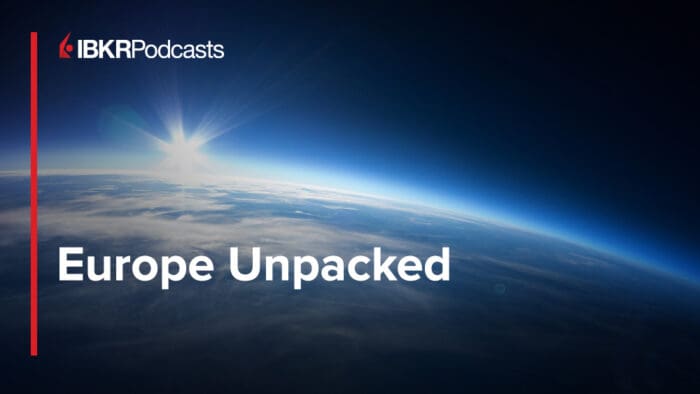Join host Andrew Wilkinson as he discusses the latest economic trends with CME Group’s Chief Economist, Erik Norland. In this episode, they explore the impact of U.S. Federal Reserve rate cuts, European market shifts, and the future of inflation across the UK and Eurozone.
Summary – IBKR Podcasts Ep. 194
The following is a summary of a live audio recording and may contain errors in spelling or grammar. Although IBKR has edited for clarity no material changes have been made.
Andrew Wilkinson
Welcome to today’s podcast from Interactive Brokers. My name is Andrew Wilkinson and joining me to discuss the state of European markets is Erik Norland. Erik is CME Group’s Chief Economist. Welcome, Erik. How are you?
Erik Norland
I’m fine. How are you doing?
Andrew Wilkinson
Doing well, thank you. I say we’re going to talk European markets, but let’s first of all, kick off with your take on the recent half percentage point reduction in interest rates at the U. S. Federal Reserve.
Do you believe that it had a knock-on effect on Europe?
Erik Norland
Well, probably a little bit. I mean, I think that what’s interesting here is that the Fed, which has very often in history, been the leader in monetary policy here is very much the follower. Rate cuts really began in Brazil, Colombia, Chile and Mexico. And then later on in Europe, the UK, Sweden, Switzerland, and Canada, and the Fed is one of the last people to get on board.
So, the Fed here is very much in a following mode.
And so they’re not really a leader in this. I think that was in part because the U.S. economy got so much more fiscal stimulus than everyone else. The GDP growth rate’s a lot higher than it is here in Europe, and that probably delayed the Fed from cutting rates.
Andrew Wilkinson
So let’s talk about the European Central Bank then, Erik. Would it be true to say that you think the market has brought forward monetary policy easing to October instead of December? And if that’s the case, what’s the cause behind it?
Erik Norland
Well, you know, I think that Europe’s economy is really in a pretty difficult situation here. I mean, you have essentially kind of a mild recession going on in Germany. You have extremely slow growth in most of the rest of the Eurozone. And the only real exceptions to that are showing still 1-2% growth in places like France and Italy.
But those countries are showing growth because they’re running massive budget deficits that are totally unsustainable. In France, the budget deficit’s 5.5% of GDP. In Italy, 7.1%. So nobody believes that this fiscal boost can be carried forward indefinitely. And indeed, the French, as we’ve seen with their new Prime Minister, Michel Barnier, are about to do a lot of belt tightening.
And I think that has the ECB nervous. I think that they don’t really want to see a recession. They see that inflation rates have come way down and they’re trying to be proactive and cut rates.
Andrew Wilkinson
So, inflation’s on its way down, but where do you see the terminal interest rate by the end of the easing cycle? And I guess when will the end of the cycle be reached?
Erik Norland
Well, I’ll tell you, our Euro ESTR futures indicate that the market’s belief is it’s going to end around 2% rates, maybe even 175. And the market thinks they’re going to continue to cut at a fairly steady pace and then eventually kind of get to a sort of floor in interest rates.
Maybe around this time next year and just sort of hold them there through maybe late 2026.
Andrew Wilkinson
So Erik, let’s turn to the United Kingdom. Bank of England Governor Bailey recently signaled a continuation of a slow and steady path lower for UK interest rates. What’s your overall view on local and regional inflation trends?
Erik Norland
So, we’ve seen a lot more progress on inflation in the Euro area than we’ve seen here in the United Kingdom. Here in the UK, inflation’s been a little bit more persistent. Core inflation’s still running at 3.5% year on year. Now, the headline’s pretty good because we’ve had this massive drop in the price of natural gas, as well as some recent declines in crude oil prices.
But you know, aside from that, the core inflation here in the UK has been a bit more persistent, and that’s I think giving the Bank of England a little bit of pause in easing policy.
Andrew Wilkinson
Erik Norland from the CME Group in London, thank you very much for joining me today.
Erik Norland
Thank you.
Andrew Wilkinson
And to the audience, remember to rate our recent episodes wherever you download your podcasts from and look out for more episodes at IBKR Podcasts.
Disclosure: CME Group
© [2023] CME Group Inc. All rights reserved. This information is reproduced by permission of CME Group Inc. and its affiliates under license. CME Group Inc. and its affiliates accept no liability or responsibility for the information contained herein, including but not limited to the currency, accuracy and/or completeness of this information, and delays, interruptions, errors or omissions. This information is an unofficial copy and may not reflect the official and accurate version. For the definitive and up-to-date version of any of this information, please see cmegroup.com.
Disclosure: Interactive Brokers
The analysis in this material is provided for information only and is not and should not be construed as an offer to sell or the solicitation of an offer to buy any security. To the extent that this material discusses general market activity, industry or sector trends or other broad-based economic or political conditions, it should not be construed as research or investment advice. To the extent that it includes references to specific securities, commodities, currencies, or other instruments, those references do not constitute a recommendation by IBKR to buy, sell or hold such investments. This material does not and is not intended to take into account the particular financial conditions, investment objectives or requirements of individual customers. Before acting on this material, you should consider whether it is suitable for your particular circumstances and, as necessary, seek professional advice.
The views and opinions expressed herein are those of the author and do not necessarily reflect the views of Interactive Brokers, its affiliates, or its employees.
Disclosure: Futures Trading
Futures are not suitable for all investors. The amount you may lose may be greater than your initial investment. Before trading futures, please read the CFTC Risk Disclosure. A copy and additional information are available at ibkr.com.
















Join The Conversation
For specific platform feedback and suggestions, please submit it directly to our team using these instructions.
If you have an account-specific question or concern, please reach out to Client Services.
We encourage you to look through our FAQs before posting. Your question may already be covered!